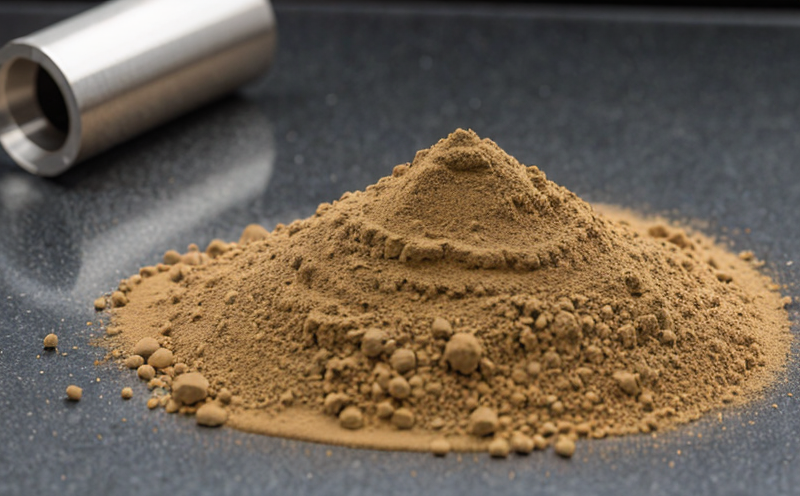ISO 10271 Corrosion Resistance of Raw Materials Testing
The ISO 10271 standard provides a comprehensive approach to assessing the corrosion resistance properties of raw materials used in additive manufacturing (AM) and 3D printing processes. This testing method is essential for ensuring that the materials meet stringent quality standards, particularly when they will be subjected to corrosive environments.
The process involves subjecting specimens made from various raw materials to controlled corrosive conditions over a specified period. The aim is to observe and measure any changes in properties such as weight loss, mass change, or other relevant indicators of corrosion resistance. This testing not only helps manufacturers ensure the reliability of their products but also aids in selecting the most suitable materials for specific applications.
For quality managers and compliance officers, understanding ISO 10271 is crucial to maintaining regulatory standards and ensuring product integrity. R&D engineers benefit from this test as it provides insights into how different raw materials perform under corrosive conditions, aiding in material selection and process optimization. Procurement professionals can leverage the results of these tests to ensure that suppliers meet stringent quality benchmarks.
The testing protocol is standardized to minimize variability and ensure consistent results across different laboratories. Specimens are typically prepared according to specific dimensions outlined in ISO 10271, ensuring uniformity for comparison purposes. The corrosive environments can include various media such as salt spray, acid solutions, or humidity chambers.
The test method is designed to simulate real-world conditions that the materials might encounter during production and use. This simulation helps predict how well a material will perform in its intended application, thereby enhancing the overall quality of products manufactured through AM processes.
For compliance officers, this testing ensures adherence to international standards, which is crucial for market access and regulatory compliance. In R&D contexts, it provides critical data that can be used to refine materials and manufacturing processes. For procurement professionals, it offers a reliable basis for selecting suppliers who meet high-quality benchmarks.
| Industry Applications |
|---|
| Additive Manufacturing (AM) |
| 3D Printing |
| Metallic Alloys |
| Plastics and Composites |
| Ceramics |
The versatility of ISO 10271 makes it applicable across various sectors, including aerospace, automotive, medical device manufacturing, and consumer goods. By ensuring that raw materials have adequate corrosion resistance, these industries can enhance the durability and reliability of their products.
Through rigorous testing, manufacturers can identify potential weaknesses in material performance early in the development process, allowing for corrective actions before full-scale production begins. This proactive approach not only reduces costs associated with product recalls but also enhances brand reputation by delivering high-quality products to the market.
Industry Applications
- Aerospace: Ensuring durability of components under corrosive environments.
- Automotive: Enhancing reliability in exterior and structural parts.
- Metallic Alloys Manufacturing: Assessing raw materials for use in precision engineering applications.
- Medical Device Manufacturing: Guaranteeing biocompatibility and longevity of implants and prosthetics.
- Consumer Goods: Improving the lifespan and performance of consumer electronics and appliances.
The ISO 10271 test is particularly beneficial for manufacturers who require a standardized approach to evaluate corrosion resistance. By adhering to this international standard, companies can ensure that their products meet the highest quality standards, thereby gaining a competitive edge in the market.
Eurolab Advantages
At Eurolab, we offer unparalleled expertise and advanced facilities for ISO 10271 testing. Our team of highly qualified professionals ensures that every test is conducted with precision and accuracy, adhering strictly to the specified standards.
- State-of-the-Art Facilities: Equipped with cutting-edge instrumentation tailored specifically for AM and 3D printing tests.
- Experienced Personnel: Our team comprises experts who have extensive experience in conducting these types of tests, ensuring reliable results.
- Comprehensive Reporting: Detailed reports are provided, including all relevant data points and analysis, allowing for comprehensive evaluation by clients.
- Custom Solutions: We offer bespoke testing services that cater to the unique needs of individual clients, whether they are large corporations or small businesses.
We pride ourselves on our commitment to excellence and client satisfaction. By choosing Eurolab, you can be assured of reliable and accurate ISO 10271 corrosion resistance tests that meet all your quality assurance requirements.
Why Choose This Test
- International Recognition: Adherence to ISO standards ensures that the test results are internationally recognized, facilitating global trade and compliance.
- Data Reliability: Rigorous testing protocols ensure consistent and reliable data, providing a solid foundation for decision-making processes.
- Cost-Effective: Early detection of potential issues through this test can prevent costly delays in product development or recalls after launch.
- Regulatory Compliance: Ensures that products meet all relevant regulatory requirements, streamlining the approval process and reducing associated risks.
- Precision Instrumentation: Utilization of advanced equipment guarantees accurate measurement and analysis.
- Client-Centric Approach: Tailored services to meet specific client needs, ensuring that every requirement is addressed comprehensively.
The ISO 10271 test is a cornerstone for quality assurance in additive manufacturing and 3D printing. By choosing this test, you are investing in the future of your products and ensuring their long-term success in the market.





